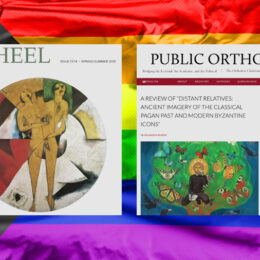 by Rdr. Daniel Manzuk –
by Rdr. Daniel Manzuk –
We are bombarded with the message that we are to be tolerant of the beliefs and practices of others. “Tolerant,” however, has come to mean “accept and condone without question or reservation”; failure to practice this form of tolerance makes one intolerant and a hater. These assertions are addressed especially to those from traditional Christian backgrounds who acknowledge that the truths in Scripture are absolute, not relative, as secular and liberal society views them.
It must be noted, too, that when entirely secularized people refuse to be tolerant of “traditional values,” they are called progressive, open-minded and enlightened, anything but intolerant; while traditional Christians are considered deluded, superstitious, brain-washed, and ignorant. (This is so despite the fact that – in all ages – living a Christian life requires a concerted effort and personal dedication –a clear choice. Just ask the Virgin Mary and the Martyrs.)
On the other end of the spectrum, there are those few who claim to hold traditional Christian values, but go beyond intolerance to outright hatred; unfortunately, those who try to stand up for Christian beliefs in a peaceful manner are lumped together with these pseudo-Christian extremists.
The common thread between the dogmatic secularists and the traditionalist extremists is their “all-or-nothing” attitudes; they are two sides of the same coin. For Orthodox Christians, neither side is right.
The common thread between the dogmatic secularists and the traditionalist extremists is their “all-or-nothing” attitudes; they are two sides of the same coin. For Orthodox Christians, neither side is right.
since Adam and Eve, amorality and immorality abound; in our time, however, they are cheered and championed as never before
As with every generation since Adam and Eve, amorality and immorality abound; in our time, however, they are cheered and championed as never before. Instead of being places to avoid, Sodom and Gomorrah have become “the place to be.” Meanwhile, as during Old and New Testament times, the faithful trying to live according to the Gospel are harassed and mocked by the unfaithful. So how does an Orthodox Christian deal with this situation? The same way God has dealt with us forever, by going beyond tolerance to love, and, at times … tough love.
In many moral controversies today, such as “open-marriage,” assisted suicide, abortion, so-called mercy-killing, and “gay marriage,” some argue that we should accept conduct that, in the Old Testament, was punishable by death. A few pseudo-Christian extremists go around the country saying that 9/11 and other tragedies are our punishment for accepting these behaviors, and that those who practice them should die because God hates them! (God does not hate anyone! Hatred is the province of Satan and his demons, who want us all to hate. Anyone who hates is not of God, as St. John the Theologian makes clear: “He who does not love does not know God, for God is love” [1 John 4:8]).
God loves us; however, like any parent, He does get angry when His children do self-destructive things.
God loves us; however, like any parent, He does get angry when His children do self-destructive things. While He repeatedly sent the Hebrews into exile for rejecting Him, He never completely wiped them out. (Just ask Noah, Jeremiah, Daniel, and so forth.) He would have spared Sodom and Gomorrah for ten righteous people (Genesis 18:32–33). We of the “Christian Era” have launched Crusades in which the crusaders killed as many Christians as infidels, and have spent centuries torturing, maiming, and imprisoning people, all in the name of Christ. We make nukes, napalm, anthrax, wipe out whole species which He created, and kill each other with impunity – yet He lets us live. He Himself said,
“If a wicked man turns from all his sins which he has committed, keeps all My statutes, and does what is lawful and right, he shall surely live; he shall not die. None of the transgressions which he has committed shall be remembered against him; because of the righteousness which he has done, he shall live. Do I have any pleasure at all that the wicked should die?” says the Lord God, “and not that he should turn from his ways and live?” (Ezekiel 18: 21–23).
Despite all we’ve done, He sent His Son to save us. (This is why we say, “Lord have mercy” so often.) Since He still loves us despite our moral failings, we must do likewise with others, lest we be like the unforgiving servant (Matthew18:21–35).
Christ doesn’t abolish the crimes or punishments laid out in the Old Testament, but He puts them in a new light.
In the New Testament, Christ doesn’t abolish the crimes or punishments laid out in the Old Testament, but He puts them in a new light. An adulterous woman is brought to Him by the men of the village, to see if He will say that she should be executed for her crime, as taught in the letter of the Mosaic Law (Deuteronomy 22:13–30; Leviticus 20:10; John 8:3–11). Christ does not abolish the penalty, but says that only one who is without sin can carry it out justly – and that one is Christ Himself. Then, as the only Righteous Judge, He grants the woman the opportunity to repent, as He would later grant the same to Peter, despite Peter’s denials of Him. No one but Christ determines ultimately who is saved and who is damned. For this reason – not to mention the Ten Commandments and the Golden Rule – hating, judging or condemning, and especially abusing or harassing people whose conduct and beliefs don’t square with Scripture is a sin, because no one abides by Scripture perfectly – except Christ.
That being said, St. Paul also warns us to avoid being led away by strange doctrines, but to hold fast the Gospel as Christ delivered it to him and the Apostles, and as he delivers it to us. We do well to follow St. Paul here, and not the “enlightened” scholar who “corrects” the interpretation of the Bible to make it fit modern mores, claiming that St. Paul and the Evangelists obviously intended what the scholar intends, despite what we see in the Bible (see Mark 7:6–8 and 2 Corinthians 11:1–15). Saint Paul says: “Jesus Christ is the same yesterday, today, and forever” (Hebrews 13:8–9). One Christian group has posters that say, “Do not put a period where God put a comma…. Christ is still speaking.” The Orthodox Church agrees, but as St. Matthew relates in Chapter 5:17–19, Christ tells us,
“Do not think that I came to destroy the Law or the Prophets. I did not come to destroy but to fulfill. For assuredly, I say to you, till heaven and earth pass away, one jot or one tittle will by no means pass from the law till all is fulfilled. Whoever therefore breaks one of the least of these commandments, and teaches men so, shall be called least in the kingdom of heaven; but whoever does and teaches them, he shall be called great in the kingdom of heaven.”
Like any parent, the Father loves us unconditionally, but He did not embrace the immorality of the people
A similar point is made repeatedly by Saint Paul, especially in Galatians 6: 6–12:
I marvel that you are turning away so soon from Him who called you in the grace of Christ, to a different gospel, which is not another; but there are some who trouble you and want to pervert the gospel of Christ. But even if we, or an angel from heaven, preach any other gospel to you than what we have preached to you, let him be accursed. As we have said before, so now I say again, if anyone preaches any other gospel to you than what you have received, let him be accursed. For do I now persuade men, or God? Or do I seek to please men? For if I still pleased men, I would not be a bond-servant of Christ. But I make known to you, brethren, that the gospel which was preached by me is not according to man. For I neither received it from man, nor was I taught it, but it came through the revelation of Jesus Christ.
Christ is always saying the same thing. Christ teaches that we are to love those who hate us, revile us, and persecute us (Matthew 5:43–48; Luke 6:27–36); and we are to love everyone (1 John 3:10–24). That does not mean, however, that we have to condone, bless and embrace their views or behavior. Like any parent, the Father loves us unconditionally, but He did not embrace the immorality of the people of the Old Testament and He does not embrace the immoral views and practices of those under the New Testament. If He did, the Gospels and Epistles combined would be two lines long; for if God approves of our sins, they wouldn’t be sins, and Christ would not have had to die to expunge them.
Christ doesn’t condone our sinful acts, and His tears in Gethsemane were as much for our lack of true repentance, as they were for Himself.
Christ doesn’t condone our sinful acts, and His tears in Gethsemane were as much for our lack of true repentance, as they were for Himself. This is little different from a parent crying when his or her child chooses to drink, do drugs, act irresponsibly, befriend the wrong people – in essence, take the wrong path: the parent cries because he or she loves the child, but hates what the child is doing and, though it may alienate the child, the parent will not condone his or her actions. John the Baptist preached publicly against Herod, but did not hate him. The Apostle Paul often castigated those he wrote (especially the Corinthians), but he did so in love. Most importantly, Christ repeatedly chastised the Pharisees, Sadducees, chief priests, elders, scribes, laypeople and even the Apostles (mostly Peter) for their false views; but He never stopped loving them. We are to do likewise.
God did lay down how He wants us to live, and what conduct He will not accept. As Orthodox Christians we are to witness to the manner of living contained in Scripture, and not self-righteously denounce others, as the Pharisee did the Publican in the parable (Luke 18:9–14), nor as the Pharisees did to the man born blind (John 9:13–34), nor as the Pharisees’ denounced Christ, for Christ Himself said:
“Judge not, and you shall not be judged. Condemn not, and you shall not be condemned. Forgive, and you will be forgiven. Give, and it will be given to you: good measure, pressed down, shaken together, and running over will be put into your bosom. For with the same measure that you use, it will be measured back to you.” “And why do you look at the speck in your brother’s eye, but do not perceive the plank in your own eye? Or how can you say to your brother, ‘Brother, let me remove the speck that is in your eye,’ when you yourself do not see the plank that is in your own eye? Hypocrite! First remove the plank from your own eye, and then you will see clearly to remove the speck that is in your brother’s eye” (Luke 6:37–38, 41–42).
We do not determine whether someone is going to hell or not! We do not get to condemn the person for his or her beliefs! Christ alone has that authority (John 5:22–30). To prevent misunderstanding: while the hierarchy can exclude those who refuse to accept the Church’s teachings from the care of the Church (excommunication), the excommunicated person is not condemned; God is the only one who makes that decision: “Those who are outside, God judges…” (1 Corinthians 5:13). The excommunicated are simply removed from the community, just as any disruptive person is from any group. Saint Paul tells us how to handle those who refuse to accept what Christ teaches: “If anyone does not obey our word in this epistle, note that person and do not keep company with him, that he may be ashamed. Yet do not count him as an enemy, but admonish him as a brother” (2 Thessalonians 3:14–15). We are to witness to the truth sternly, resolutely, humbly, in the same way Christ witnessed to it on earth. As President Lincoln once said: “With malice towards none, with charity for all.”
we are to resist “peer pressure” and refuse to endorse and condone what Scripture does not endorse or condone
Thus the Orthodox Church’s teaching concerning relations with those of other beliefs and behaviors differs greatly from alternative understandings of tolerance. We are to show love for all and respect for their right to their beliefs, in any case, even those beliefs that differ from ours. (So the Good Samaritan did not treat the victimized Jew differently, despite the animosity between their groups [Luke 10:25–37].) At the same time, we are to resist “peer pressure” and refuse to endorse and condone what Scripture does not endorse or condone, as the Prophet Nathan did with King David over his taking of Bathsheba, for example. Just as others today stand for their beliefs, we should stand for the truth. We can do so in a non-confrontational manner, but simply say, “That goes against my beliefs, and, as you want your beliefs respected, I hope you’ll respect mine.” If our interlocutor asks why, we can explain the scriptural reasons, as St. Paul directs, “speaking the truth in love” (Ephesians 4:15). (Ask your priest for help, if needed.) If he or she doesn’t question us, we can move on (Romans 16:7; 2 Thessalonians 3:6).
This applies chiefly to personal relationships; when it comes to anti-Scriptural beliefs and standards being codified in law or government regulations – especially in this country of free speech and beliefs – we can and must state the truth, still following St. Paul’s admonition from Ephesians, yet never wavering until the truth wins out (either by vote or court decision or the Second Coming).
Christ wants people to flee sin … not other people.
Archbishop Iakovos, of thrice-blessed memory, exemplified this when he marched with the evermemorable Dr. Martin Luther King Jr. at a time and in a region where it was unquestionably politically incorrect to call for equal rights for black people, and supporters were hated with a demonic passion. Our witness to the truth, however, must be made with respect, as the Prophet Daniel respectfully greeted Nebuchadnezzar with “O King, you are the King of Kings,” and then proceeded to state what God desired firmly and humbly (Daniel 2:36–45). As in all things, we Christians must not only speak the truth; more importantly, we must live it, as the renowned ascetic Francis of Assisi said, “Preach the Gospel at all times, and if you must, use words.” Don’t give fire-and-brimstone exhortations; those turn people off. Christ wants people to flee sin … not other people.
We commit sins regularly, yet Christ still loves us. He refuses to condone the sin, but He still loves us; we are to love others the same way. In this way, we are beyond “tolerant”; we are Christian.
That we should no longer be children, tossed to and fro and carried about with every wind of doctrine, by the trickery of men, in the cunning craftiness of deceitful plotting, but, speaking the truth in love, may grow up in all things into Him who is the head –Christ–from whom the whole body, joined and knit together by what every joint supplies, according to the effective working by which every part does its share, causes growth of the body for the edifying of itself in love (Ephesians 4:14–16; New King James Version).
Abhor what is evil. Cling to what is good.
Let love be without hypocrisy. Abhor what is evil. Cling to what is good. Be kindly affectionate to one another with brotherly love, in honor giving preference to one another; not lagging in diligence, fervent in spirit, serving the Lord; rejoicing in hope, patient in tribulation, continuing steadfastly in prayer; distributing to the needs of the saints, given to hospitality. Bless those who persecute you; bless and do not curse. Rejoice with those who rejoice, and weep with those who weep. Be of the same mind toward one another. Do not set your mind on high things, but associate with the humble. Do not be wise in your own opinion. Repay no one evil for evil. Have regard for good things in the sight of all men. If it is possible, as much as depends on you, live peaceably with all men (Romans 12:8–10; New King James Version).



